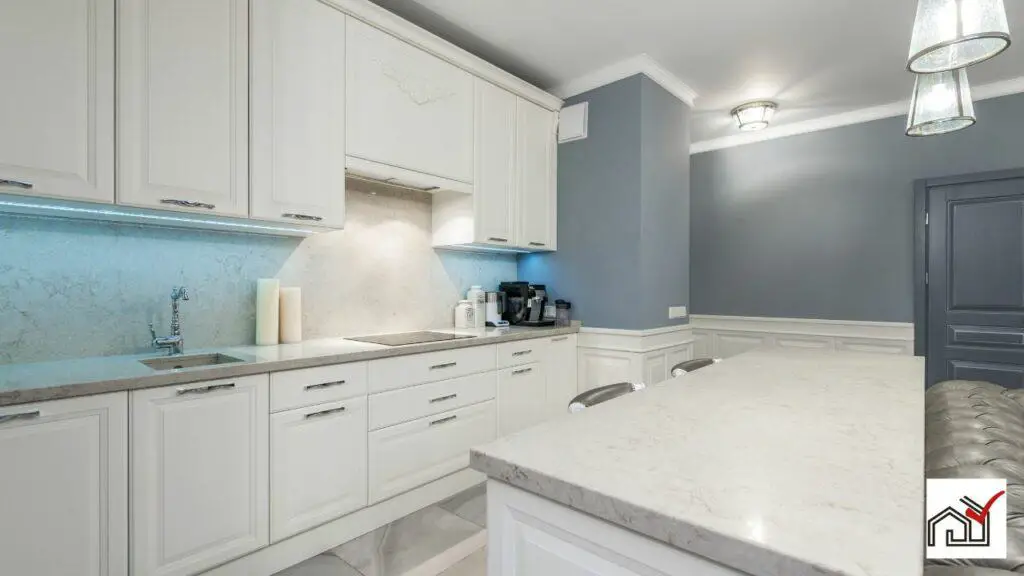Marble countertops are appreciated for their beauty but are prone to staining due to their porosity. They can absorb liquids, leading to discoloration, especially from acidic substances like wine, coffee, and citrus juices, and from oils.
To prevent stains, it’s important to seal marble surfaces regularly, clean spills quickly, and use the right cleaning methods. These steps are crucial to keep marble countertops looking good.
Understanding Marble Porosity
Marble countertops are porous and require sealing to protect against stains. Made mostly of calcium carbonate, marble is prone to damage from household substances. Its porosity allows liquids to seep in, potentially causing discoloration and water stains.
Experts recommend routinely sealing marble countertops to prevent stains. Sealants act as a barrier, reducing absorption of spills. While sealing helps, it doesn’t completely prevent stains, but allows more time to clean spills before they settle in.
It’s advised to reseal marble at least once a year, especially in areas where oils are used, as they can cause dark stains. Polishing marble also helps by enhancing its resistance to water and maintaining its shine.
Regular care, including sealing and polishing, helps maintain marble’s appearance and durability.
Identifying Common Stain Causes
Marble countertops are prone to staining due to their porous nature, which allows liquids to be absorbed, causing discoloration. Common substances that stain marble include acidic items like coffee, soda, tea, wine, fruit juices, and citric acids, leading to both stains and etching that dulls the surface. Oily substances such as salad dressing and cooking oils can also create persistent stains.
To protect marble, it is advised to reseal the countertops annually, which helps prevent the absorption of stains. Regular polishing can maintain the seal and reduce the appearance of water spots and fingerprints.
For cleaning stains, hydrogen peroxide can be effective on light-colored marble for organic stains, but it must be used with caution to avoid damaging the marble’s seal and finish. Proper knowledge of stain sources and marble’s characteristics is crucial for maintaining its appearance and durability.
Marble Stain Prevention Techniques
To prevent stains on marble countertops, it is important to use specific measures since marble is porous and prone to staining. Regular cleaning and sealing are necessary to protect the surface.
Applying a high-quality sealant regularly is key to creating a protective barrier that reduces liquid absorption and protects against oil-based stains. This is especially useful to prevent stains from kitchen spills like salad dressing and cooking oil.
When cleaning marble, it is important to use cleaners designed for natural stone, such as Granite Gold Daily Cleaner Spray, to avoid damage from harsh chemicals found in many traditional cleaners.
Acidic substances like coffee, soda, wine, and fruit juices can etch and stain marble. Spills should be wiped up immediately to prevent the marble from absorbing these liquids.
Regular polishing with pH-neutral cleaners is also important for maintaining the marble’s appearance and enhancing the sealant’s protective qualities. Avoid using abrasive materials and acidic cleaners that can scratch or damage the marble surface.
Effective Marble Cleaning Practices
Cleaning marble countertops properly is important to keep them looking good and durable. Marble is porous and can stain from oil and water. Use pH-neutral cleaners made for natural stone to avoid damaging the sealant.
Quickly wipe up spills, especially from acidic substances like coffee, soda, and wine, to prevent etching and permanent damage. For daily cleaning, use a soft cloth with water and a little mild dish soap. Do not use strong chemicals as they can dull and damage the marble.
Regular polishing of marble surfaces helps maintain their beauty and strengthens the sealant, making them less prone to stains from hard water and fingerprints. Marble needs more care than engineered stone.
To protect against stains, reseal marble countertops as needed. To test if resealing is necessary, drop some water on the surface. If it beads, the seal is good. If it soaks in, it’s time to reapply sealant.
Following these practices will help keep your marble countertops elegant.
Solutions for Stubborn Stains
To remove stubborn stains from marble countertops, it’s important to first identify the stain type: oil-based, organic, or hard water.
For oil-based stains, mix baking soda with water to form a paste. Apply this to the stain, cover with plastic, and leave for 24 hours before wiping and rinsing thoroughly.
For organic stains like food, coffee, or wine, use hydrogen peroxide with a few drops of ammonia on raw marble. Be cautious with ammonia to prevent surface etching. Clean the area gently afterward with a damp cloth.
Avoid abrasive scrubbing to prevent surface damage.
After stain removal, dry the area and reseal the marble. Regular polishing helps maintain the shine and facilitates easier cleaning, keeping marble countertops looking good and preventing stains from becoming permanent.




